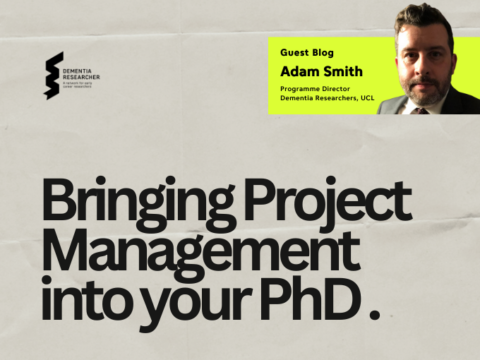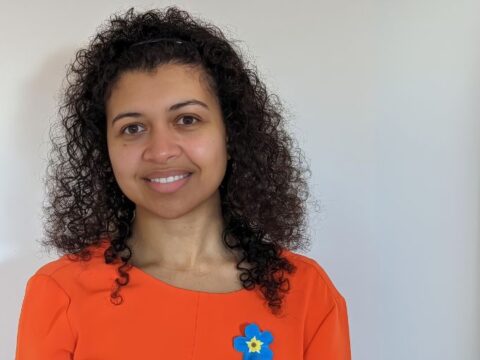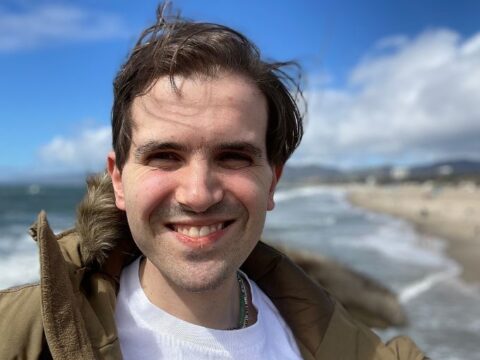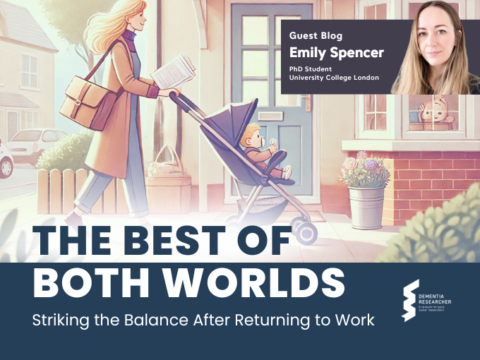In 2015 Professor Rossor from University College London and Professor Martin Knapp from The London School of Economics published a paper in the Lancet entitled ‘Can we model a cognitive footprint of interventions and policies to help to meet the global challenge of dementia?’
In this podcast Piers Kotting talks to Professor Rossor and Professor Parashkev Nachev exploring the concept of a ‘Cognitive Footprint’ and getting behind the follow-up research has already undertaken in this field, and plans for the new work recently funded by The Health Foundation.
You can contact the Cognitive Footprint team via email at cognitivefootprint@ucl.ac.uk or find them on twitter @cog_footprint
Voice Over:
Welcome to the NIHR Dementia Researcher Podcast, brought to you by
dementiaresearcher.nihr.ac.uk in association with Alzheimer’s Research UK and Alzheimer’s Society, supporting Early Career Researchers across the world.
Piers Kotting:
Hello, I’m Piers Kotting and I’m delighted to be hosting this podcast today for the NIHR Dementia Researcher website. This week I’m joined by two academic neurologists from University College London, and I have to be a bit careful because of them is my boss, to discuss their rather unique work on the concept of a cognitive footprint. So hello and welcome to Professor Martin Rossor and Professor Parashkev Nachev. So, Martin, Parashkev before I get going can I just ask you to both introduce yourselves and just tell us a little bit about your background.
Martin Rossor:
Yes, so I’m Martin Rossor, I’m a clinical neurologist with a particular interest in cognitive disorders, and I’m the NIHR Director for Dementia Research.
Parashkev Nachev:
And I’m Parashkev Nachev, I’m a neurologist whose research work is primarily focused on the application of complex models to predominately patients with focal brain injury.
Piers Kotting:
Fantastic, thank you. So, back in July 2015 Professor Rossor and Professor Martin Knapp from the London School of Economics published a paper in the Lancet entitled ‘Can we model a cognitive footprint of interventions and policies to help meet the global challenge of dementia’. So, Martin, obviously we’ve all heard and understand the concept of carbon footprint, but can you explain what the concept of a cognitive footprint is?
Martin Rossor:
Well it is very similar to a carbon footprint, so the intention was can we develop a measure of cognition by that the summation of an individual’s cognitive skills such that they can maximise them and that can be applied to an individual or to a group or to a society. And this came about partly from the fact that we tend to forget just how variable and fluid our cognition is – it fluctuates quite a lot during the day and it can fluctuate through our lifetime. So the question was can we develop a metric and yes, in a sense it plagiarised the carbon footprint that can give us both the, the effect size of an intervention but also the duration of it because that’s often something that’s forgotten about.
Piers Kotting:
Ok, I understand, so could you give us an example, flesh it out, an example where you might use such a metric.
Martin Rossor:
Well, maybe going to a policy level, so a lot of drugs that we use for every day conditions have cognitive side effects, we’ve all experienced that, they may make us rather sleepy, drowsy, that’s the commonest side effect, so if we took a disorder that we don’t normally think of as being related to cognition, actually quite a good one might be hay fever because in the past the drugs we used had a lot of drowsiness as a side effect. So, when one does a randomised trial, let’s day we’ve got two drugs and we want to know if they are any good at treating hay fever, let’s say they are the same, but if we assess cognition such that we can determine the cognitive footprint, so what we want to know is not only the effect size, but also the fact that somebody who is on this may be on it for 3 months a year for the next 20 years, so that’s a much bigger footprint than if they’re just on a drug for a week. If both of those drugs are exactly the same in dealing with the primary disease for which they’re designed, then you go for the one with the positive or least negative cognitive footprint.
Piers Kotting:
Ok, that’s really interesting and so you talked there about the length of effect, so presumably this could be used for making decisions for example in public health interventions to decide, you know, of different interventions that might, you might implement when you might implement them based on the overall cognitive footprint over a lifetime rather than a short-term effect that a measure might have.
Martin Rossor:
Absolutely.
Piers Kotting:
So that paper was put out in 2015, how’s the research community rallied, responded to the concept?
Martin Rossor:
Well there’s been a lot of interest in terms of emails and comments, the challenge of course is pinning it down, operationalising it and getting out the programme of work that will explore the different components and that’s very much the work in progress.
Piers Kotting:
We’ll come to that in a moment. In the original paper, Martin, you said that it in a post-industrial society cognitive function’s fundamental to meeting our challenges and driving innovation. So how well recognised do you think this is by policy makers and by people at large?
Martin Rossor:
I have a sense that it’s not been highlighted, which is unusual because it, it’s quintessentially what makes an organism function and particularly for humans and our cognitive abilities and this is not, this is maximising an individual and societies cognitive abilities are what have allowed us to meet many challenges in human history. We’ve not been very good at brain health, we’ve been very good at heart health, we’ve been less good at brain health and I think it’s not really been a focus of policy.
Piers Kotting:
So, this work broadly is aimed at that, at changing that conversation by being able to measure and quantify and explain the impact of something.
Martin Rossor:
It is, and slightly for me to broaden it from where brain health is I think at the moment where an awful lot of effort how do we prevent decline in later life, prevent dementias, that’s very important and hopefully cognitive footprint would have a role in that. But it is also that during our 80 years we’ve got something that has a small effect, I gave an example of a medication before that has an effect over 30 or 40 years that adds up to having a year of much more severe cognitive impairment and we need to be able to make that sort of balance.
Piers Kotting:
Really interesting. Parashkev, so I understand you’re exploring the relationship between the, or the relationship of cognition to place using a novel statistical method Geo-statistical modelling. Can you explain what that is and how you’re using it in this cognitive footprint.
Parashkev Nachev:
Yes so here we have two very complex patterns, one is a pattern of cognitive dysfunction that might occur in any person either because of some external influence or because of a disease process, and then there is the complex pattern of factors that exacerbate or alleviate that and the question is how can we find some kind of order that connects the two. What’s attractive about thinking about space is that it is a dimension along which external factors but also populations themselves are grouped. And so if we can derive insights into the special organisation of these patterns, the patterns and factors that influence our cognition then we might be able to gain some insights into what it is that we can modify in order to improve cognition within the particular place. Now, it turns out that actually computing spatial effects is quite difficult and even though Geo-statistics is a relatively mature discipline you don’t often see beautiful maps of geographical distributions of risk of illness for example or any other kind of influence and so what we did was to take a very mature, very sophisticated way of examining spatial relations, the statistical parametric mapping framework applied to brains, those beautiful coloured maps of the brain lighting up when you do x, y or z. And essential translate the same formal approach to modelling to geography, and it turns out that just as it’s worked beautifully in the brain, it also works beautifully in relation to mapping space and it may well turn out to be far more efficient, far easier to deploy and so potentially a powerful tool to understand these complex relationships.
Piers Kotting:
Ok, so ok for our neuroscience listeners instead of modelling the relationship between cognition to the anatomy of someone’s brain, you’re essentially using the same principles to map the relationship between their cognition and their, their life, where they live their life.
Parashkev Nachev:
That’s right and in fact those who are familiar with SPM they have a little toolbox that will allow them to press more or less the same buttons and produce a completely different picture, not of the brain but picture of the geography of the patients that they are studying.
Piers Kotting:
So we will come on to that later how our listeners and early career researchers might respond to the challenge of developing a cognitive footprint, but you’re saying those that are already familiar with the techniques might find this really accessible.
Parashkev Nachev:
Yes, certainly to the extent which we’re talking about the spatial component.
Piers Kotting:
So Parashkev, Martin mentioned measuring cognitive footprint, creating a metric, but cognition is, as you’ve already discussed, really dimensional, and can be affected by a number of factors, Martin talked about the sort of short and long term nature of cognition and I imagine it’s quite challenging to develop a metric, how are you going about that?
Parashkev Nachev:
Well, so clearly there’s the multi-dimensionality and the idea that so thinking any kind of thought can be applied to a variety of domains and the fact that someone is good at one thing doesn’t necessarily that they won’t have trouble in another so the dimensionality is one aspect. But the other thing about cognition is that it doesn’t have the visibility of many other deficits, or indeed abilities, because it is only deployed in a particular context and so it’s very hard for us to see it, and in order for us to measure the impact of an external influence, in order for us to know how capable somebody is in doing something we clearly need to recreate the context in which that ability is tested, that’s easy when you’re talking about sums, you can simply present them with an equation to solve but what happens when the nature of the ability itself requires a very complex environment – let’s take for example the abilities that are necessary for us to plan out lives, what we need to do is recreate life planning in a laboratory, that’s not easy. And so it is the fundamental complexity of the sorts of powers that are deployed in the process of cognition that makes assaying them very difficult and this is where we need to think very carefully about how we come up with a suite of measures that is both comprehensive but at the same time, reasonably compact so that we can actually isolate reasonably tractable metrics for individual patients.
Piers Kotting:
And is that an endeavour that you’re doing very much here within your research group at UCL, or is that something that is really, you know that you’re working with others on or working, you know looking at ways to measure that may already exist and adapting them for this purpose?
Parashkev Nachev:
Well, I suspect that the ultimate solution would be to see what parallels there are, what collinearities exist across the huge corpus of tests that are being employed in neuropsychology over many decades, centuries almost and to see how it is that if we extract intelligence of our previous experience from the application of these tests, is the common deep structure that we can pull out that would then allow us to produce a test that is both compact and comprehensive and this is an area where we feel machine learning has much to offer because it allows us to to transform that kind of synoptic perspective from a huge, huge sort of previous evidence from a very heterogeneous set of tests and to use that in order to extract the unified test that essentially combines all of them into one, rolls them up into one, without being reductive, without the resultant picture being too glossy because that’s a problem, you need to maintain the detail otherwise we won’t have sufficient individuating power.
Piers Kotting:
And where have you got to on that journey Martin, in terms of the development of that measurement tool?
Martin Rossor:
It’s still early days, I think there is a bit of a tension here, a tension between lumping and splitting although I wouldn’t like to use lumping in relation to PARASHKEV’s comments about being able to summate things but we’ve been very good at understanding cortical modules for doing particular tasks and people have attempted summation but it’s always been a little bit difficult and you lose as you say some of that richness, in order to get a cognitive footprint we don’t necessarily have to have that sort of holy grail of something that can capture everything, there are some functions like attention which are very important underlying an awful lot of how we interact with the environment and which are quite sensitive to some of those short term and day to day fluctuations and although it may be impartial, there’s nothing to stop one creating or measuring a cognitive footprint that might just be subtended on a measure of attention, but again can give you that sense of integrating over time, and give you the area under the curve, but this is still, you know, one’s feeling one’s way.
Piers Kotting:
Yeah so I guess eventually you will see the application of this in large sort of real time populations where you’ll need to measure things that are measurable in those environments but right now it’s a matter of doing the basic science as it were to understand how you’ll develop those measures or which surrogate measures you’re going to use like attention.
Martin Rossor:
Yes, absolutely right and I think you can have small scale cognitive footprint, exercise might be a good example, you can, if you do a lot of exercise there is evidence that it in fact you don’t perform so well immediately afterwards, you’re just tired! And you know if you have a lot of lactic in your muscles you tend to want to curl up the next day and hide away in a safe cave, but then you’ve got the longer term benefits and it’s exploring that so that you can maximise for the individual, at a policy level for societies then I think that’s a very interesting area and I think there are some which are of particular interest to the geo-statistical modelling and some of the big problems we have for example around global warming so pollution is very much a spatial problem and you know there’s increasing evidence that this really is bad for cognition, the cognitive footprint of exposure to pollution as a child is massive because it may have an effect over a lifetime.
Piers Kotting:
That’s really interesting, in your original paper you identified a whole range of areas, so there you’ve talked about one, health social care, education, criminal justice, transport, sport, employment, to mention the environment and pollution, given from a UK perspective, we’ve got a lot of listeners in the UK and overseas, where do you see other areas of sort of policy do you see that might help you sort of connect in and drive this concept forward, really to both of you, where’s the pull, you said earlier that this has not got traction yet, yet you’re very convincing and convinced that it has and needs to have, so where is the pull coming from over the next few years from a macro level.
Martin Rossor:
So pulls come once you can give a push that this is something that is tractable and measurable I think is the key thing. For me the concept on just focussing on cognition and effects that may be relatively small at an individual level are really very important, globally there are some diseases that I was taught really didn’t have much in the way of cognitive effects but are very wide-spread like neuropsychosis, yes it has cognitive effects people can get seizures but the view was it doesn’t have that much of an effect but it does, it’s not the size of an effect of Alzheimer’s disease but when you consider that it affects young children, people may suffer the effects over the lifetime and it is one of the major WHO disease in terms of prevalence, this has got a big cognitive footprint I would guess.
Parashkev Nachev:
I mean if we were in power then of course we would impose it [laughing] but we’re not, and those who are in power get most excited about the economics of life and one can see that this is a perhaps most persuasive sitting at the intersection between economics, healthcare and I suppose you know social organisation, how do you actually change society so that we’ll both live better and more productive and actually this is an area of interest to the charity that is supporting this work – the Health Foundation and I suppose if we are able to quantify in economic terms what the benefits of improving cognitive function then that might make politicians who are I suppose the ultimate decision makers, sit up and listen, at least a bit more closely.
Piers Kotting:
It’s really interesting and I think you make a compelling case and have given lots of examples that this is a potential concept that is potentially interesting to a very wide selection of the research community for sure, I mean you’ll be looking to pull all sorts of people in from all sorts of disciplines and all sorts of domains, and as you know that our podcast listeners are largely early career researchers, so how can they get involved and what’s your message to our listeners in terms of what they can do and how they can help take the concept forward?
Martin Rossor:
We’re very keen to have people’s ideas and questions so we are setting up a website which can provide a form for people to just discuss ideas and questions and I think that can be really really helpful if somebody thinks that sounds quite interesting and they’re thinking about it we’d love to hear from you.
Parashkev Nachev:
What we’re developing is a suite of tools embodied in software that others can deploy in relation to their own problem and actually the more evidence we have that the approach both on the side of the way in which we think about cognition but also in terms of the spatial modelling, the more evidence that we can bring that it does actually work it does produce, it does yield insights that appear to illuminate the fundamental processes that we’re trying to uncover here, then the more persuasive the overall approach will be.
Piers Kotting:
So I think we’re coming pretty much to the end now, any final points either of you would like to make before we draw it to a close.
Martin Rossor:
You’ve persuaded me Parashkev [laughing].
Piers Kotting:
Thank you both, thank you. So if any of our listeners have anything to add on this topic and I think there has been a call to action from Martin, please do post your comments on the website or drop us a line on twitter #ECRDementia. As well as daily posts, jobs, funding opportunities and events, our website also has profiles on all of our podcast panellists and we’ll have information on the website that Martin mentioned so please do visit there to find out more. There you will also find a transcript of this podcast so please do tell any colleagues who may not be able to listen. In our Whatsapp group we host a fortnightly themed discussion, details of how to join can be found on our twitter feed and on the ask the expert page on our website. Finally please remember to subscribe and leave a review of this podcast through our website, iTunes, Spotify, Podbean and Soundcloud and please tell your friends and colleagues. Thank you.
Voice Over:
Brought to you by the NIHR Dementia Researcher Podcast, brought to you by
dementiaresearcher.nihr.ac.uk in association with Alzheimer’s Research UK and Alzheimer’s Society, supporting Early Career Researchers across the world.
END
Like what you hear? Please review, like, and share our podcast – and don’t forget to subscribe to ensure you never miss an episode.
If you would like to share your own experiences or discuss your research in a blog or on a podcast, drop us a line to adam.smith@nihr.ac.uk or find us on twitter @dem_researcher
You can find our podcast on iTunes, SoundCloud and Spotify (and most podcast apps).

 Print This Post
Print This Post





